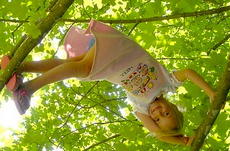An interesting read from Psychology Today on children, free play & ‘normal’ emotional development. After all, ‘knowledge is power’…
Free Play Is Essential for Normal Emotional Development
Why Mother Nature motivates our children to play in emotionally exciting ways.
Published on June 21, 2012 by Peter Gray in Freedom to Learn
In play, children practice many skills that are crucial for healthy development. They practice physical and manual skills, intellectual skills, and social skills. I have written about all of this in previous posts. They also practice emotional skills. In play, children learn how to regulate their fear and anger and thereby how to maintain emotional control in threatening real-life situations.
“Dangerous” Play
Children love to play in emotionally exciting ways. Little ones delight in being tossed into the air or swung around by adults or teenagers (but only if the children themselves determine the height of the tosses and the vigor of the swinging). They also love to be chased by a “monster.” Somewhat older children enjoy somersaulting, pirouetting, cartwheeling, and other forms of spinning around; sliding, swinging high, and teeter-tottering on playground equipment; climbing trees or up the sides of buildings; leaping from heights onto water or snowbanks; and zipping around on scooters, bikes, skateboards, skis, and other devices that permit speed. Children of all ages seem to have a sense of their limits in such play. They typically start at low heights or slow speeds and move gradually up. They take risks in moderation. The joy of play combined with a modicum of fear is the exquisite sensation we all identify as thrill. But being thrown too high, or falling too far, or moving too fast is not thrill but terror.
Click here to continue reading.
